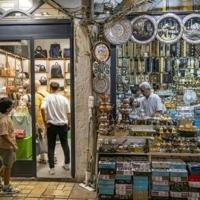In Istanbul’s Grand Bazaar, cut-price branded perfumes and fake high-end handbags can be found lining the ornate alleys. Traditional merchants are concerned that luxury counterfeits are degrading the marketplace’s unique character.
Hasim Gureli, the vice-president of the bazaar’s traders’ association, reminisced about the past when imitations were rare and those who sold fake bags were afraid of being caught by the authorities.
Many long-time merchants at the bazaar are saddened to see it overrun by fraudulent replicas, with tea set-seller Gazi Uludag stating that the Grand Bazaar has lost its distinctive charm.
Florence Heilbronn-Ogutgen, a shopkeeper at the bazaar since 1998, shared how artisans are struggling to survive amidst the competition from counterfeit goods, leading to the loss of the bazaar’s soul.
– Cheap luxury –
The Grand Bazaar attracts millions of tourists annually with the promise of affordable luxury goods. Kemal, a vendor, mentioned how luxury fakes are gradually taking over the bazaar, offering high-quality knock-offs at a fraction of the price.
Kemal’s imitation handbags are renowned for their quality and affordability, with the Grand Bazaar becoming a hub for a variety of counterfeit products.
– ‘Very high profits’ –
Counterfeit goods play a significant role in Turkey’s economy, with a lucrative trade from small retailers to manufacturers exporting fakes to the European Union. The widespread cultural acceptance of counterfeiting in Turkey poses challenges for enforcement efforts.
– ‘I have no choice’ –
Although efforts are made to crack down on counterfeiters, the sheer number of shops in the Grand Bazaar makes enforcement difficult. Despite facing fines and legal consequences, shopkeepers like Murat continue trading counterfeit goods due to limited alternatives.
rba/sbk/gv/dl





